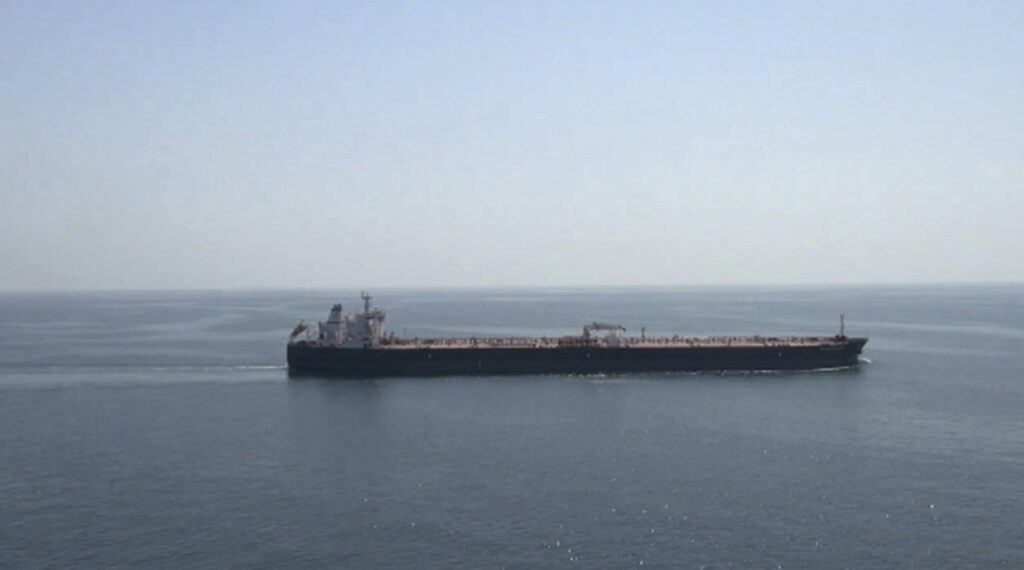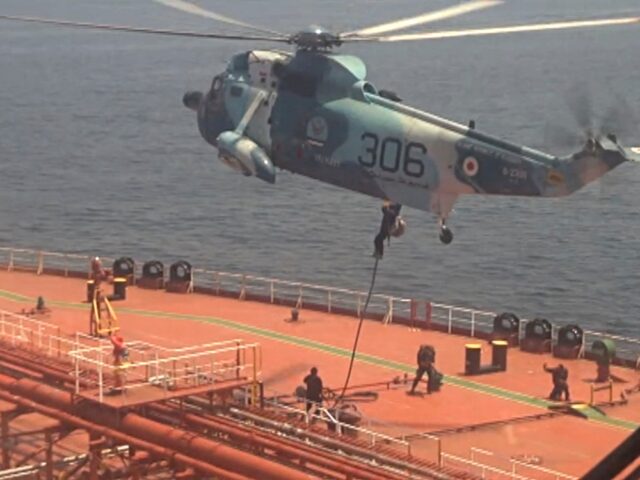Iran confirmed on Wednesday it would seize the oil aboard the Advantage Sweet, a cargo ship the regime seized in the Persian Gulf in April alleging it had been involved in a maritime collision.
Iran’s state-run PressTV reported that the Iranian government had seized the oil, which was en route to Texas to be processed by the American oil giant Chevron, to compensate Iranians who had sued the American government on the grounds that sanctions on the state sponsor of terror made it impossible for them to secure critical medication.
The Advantage Sweet displays the flag of the Marshall Islands and was traveling from Kuwait, where the oil is believed to have originated, to Houston, Texas, when the Iranian Navy intercepted and seized it in April 2023. The oil onboard is believed to be worth $50 million.
The seizure of the ship’s cargo follows a tumultuous month at sea in the Middle East, largely the product of the Iranian proxy terrorist organization Ansar Allah, more commonly known as the Houthis, declaring “war” on Israel in support of the fellow Iran-backed terror group Hamas. The Houthi “war” has consisted in attacking commercial ships transiting in and around the Red Sea, resulting in skyrocketing insurance and shipping rates and a significant disruption in global commerce, as ships avoid Mideast waters and redirect around the Cape of Good Hope in Africa. The potential for Iranian government seizures of commercial ships for shifting reasons could add to concerns that shipping around the Red Sea is no longer a safe option for many companies.
“[An] unknown ship collided with an Iranian vessel last night in the Persian Gulf, causing several Iranian crew members to go missing and get injured,” Iranian state media reported in April, according to the U.S. Naval Institute, as the excuse for seizing the Advantage Sweet.

This frame grab from video footage released Friday April 28, 2023 by the Iranian Navy, shows the Advantage Sweet, a Marshall Islands-flagged oil tanker’s deck in the Gulf of Oman. (Iranian Navy via AP)
U.S. Central Command (CENTCOM), which is in charge of Pentagon operations in the Middle East, issued a statement in the immediate aftermath of the seizure of the ship blaming the Iranian Navy for stealing the ship.
“In the past two years, Iran has unlawfully seized at least five commercial vessels sailing in the Middle East,” CENTCOM observed.
On Wednesday, PressTV claimed that the seizure of the oil – which it described as American and not specifically owned by Chevron – was related to a lawsuit by Iranian patients suffering from epidermolysis bullosa (EB).
“In their compliant, the EB patients, who are characterized by extreme fragility of the skin and mechanically induced blistering, claimed damages against the US,” PressTV explained. “They said that the Western sanctions, especially those by the US, have prevented a Swedish company from selling medicines to Iran and caused severe physical and mental harm to them.”
The Iranian state outlet claimed that the sanctions that prevent the sale of these products were the result of former President Donald Trump withdrawing from the “Joint Comprehensive Plan of Action” (JCPOA), or Iran nuclear deal, in 2018. The Swedish company in question reportedly stopped interacting with Iranian companies following the imposition of those sanctions.
PressTV did not specify if the sanctions actually prevented Swedish medical companies from selling to Iran or if the companies chose to our of an abundance of caution. It also did not specify any relationship between the Marshall Islands-flagged oil tanker and the EB patients. Tasnim News, another Iranian news outlet, stated only that the Iranian court handling the case identified the oil on the ship as a mode of issuing redress to the plaintiffs in the lawsuit and issued a “warrant for the confiscation of the American oil cargo” this week.
According to the American Academy of Dermatology (AAD), epidermolysis bollusa describes several skin conditions that cause painful blistering.
“The effects that EB has on a child’s life varies considerably. Some children have a mild disease that requires taking precautions to prevent injuries. At the other end of the spectrum, EB can cause lifelong disability that needs ongoing medical care,” the AAD explains.
The U.S. Treasury’s Office of Foreign Assets Control (OFAC) identifies medicine as one of several categories of products exempt from Iranian sanctions, defying Tehran’s claims regarding the alleged EB lawsuit.
“The U.S. maintains broad authorizations and exceptions that allow for the sale of food, medicine, and medical devices by U.S. persons or from the United States to Iran,” OFAC explains in a 2013 guidance still posted on its website. “U.S. sanctions laws provide similar allowances for sales of food, agricultural commodities, medicine, and medical devices to Iran by non-U.S. persons.”
Chevron has yet to issue a statement on the matter at press time. One of the world’s largest oil companies, Chevron recently expanded its business with Iran’s top ally in the Western Hemisphere, the socialist regime of Venezuela, thanks to a sanctions exemption offered by the administration of leftist American President Joe Biden. In November 2022, the Biden administration allowed Chevron to resume oil production in Venezuela despite the existence of sanctions on the Venezuelan oil industry in response to pervasive human rights abuses under dictator Nicolás Maduro. The license granted to Chevron reportedly led to a 113-percent growth in trade between Venezuela and the United States in the first half of 2023.
In September, reports indicated that Chevron was planning to expand oil production in Venezuela, where the Iranian government is reportedly helping to rehabilitate Venezuela’s dilapidated oil refineries and processing facilities.
Chevron CEO Mike Wirth noted in a television appearance in January that sanctions on the Iranian oil industry appear to have had no significant effect on global oil trade.
“Orices went up because oil prices went up when the war in Ukraine broke out. Prices came down as people realized that oil supplies weren’t threatened,” Wirth explained on the CNBC program Squawk Box. “So, there were sanctions that were imposed on Russia, but the Russian oil kept coming into the market. The sanctions that were imposed on Iran have not been enforced.”

COMMENTS
Please let us know if you're having issues with commenting.